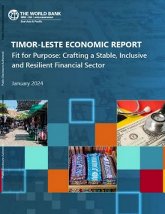The government's focus on capital expenditure and infrastructure investment, increasing the budget from 18.4% of GDP in 2023 to 24.5% of GDP in the 2024, is likely to further drive growth, the report says.
Growth is anticipated to have tapered to 2.3% in 2023 from 4% in 2022 due to a deceleration in economic activity associated with pauses in government spending during the political transition.
Inflation is projected to ease in 2024, driven by a moderation in global commodity prices and a stabilization of global food security conditions. Reduced inflation among Timor-Leste’s trading partners is expected to lessen imported inflation. Albeit beneficial in easing price pressures, the new government's decision to revoke the implementation of revenue measures, such as excise duties on sugar, sugary beverages, and tobacco, may undermine efforts aimed at increasing revenue collection and controlling the consumption of goods that have negative health impacts.
Export growth may face challenges due to a dependence on coffee as the primary export commodity. Developing alternative sectors could provide a buffer against external economic shocks, ensure a more balanced and resilient economic landscape, and will be essential for sustaining Timor-Leste's economic growth.
The outlook is subject to several downside risks. Weather events could disrupt rice availability and imports; rising food and energy prices could require a fiscal response. Fluctuations in the U.S. dollar could affect trade revenues and the local cost of living.
“Timor-Leste's economy has demonstrated remarkable resilience, and as we look ahead in 2024, greater attention to capital investment in the national budget will buoy the outlook,” said Bernard Harborne, World Bank Country Representative for Timor-Leste. “Accession to the World Trade Organization is also expected to deliver a positive bounce to the economy. However, to reap the full benefit of WTO accession, greater diversification of the economy and steps to improve access to finance for the private sector will be important."
The report includes a special chapter on building a stable, inclusive, and resilient financial sector. Development of the financial sector will be a key driver for economic growth and will help households save and plan, help firms grow and thrive, and build resilience to economic shocks. Timor-Leste’s financial sector currently faces challenges such as limited credit access, low utilization of digital financial services, and vulnerability to external shocks like natural disasters, the report finds. The level of credit to the private sector in Timor-Leste – a key indicator of the reach and inclusiveness of the financial sector – stands at only 28.9% of GDP, among the lowest levels in the world.
To strengthen Timor-Leste's financial sector, enhancing the regulatory framework to support financial stability, promoting financial literacy and inclusion, especially in rural areas, and encouraging the adoption of digital financial services would be useful steps. In addition, developing infrastructure to support a broader range of financial services, diversifying the financial sector to reduce reliance on traditional banking, and implementing measures to mitigate risks associated with external shocks will help create a more inclusive, stable, and resilient financial sector, which is crucial for the sustained economic growth and development of Timor-Leste.

